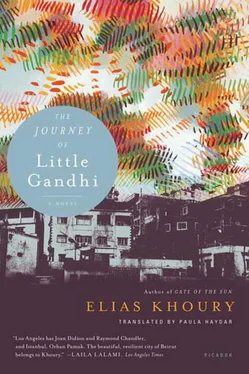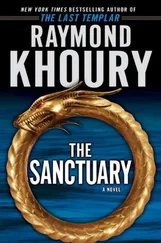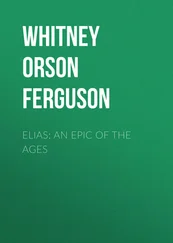“Yes,” Gandhi answered.
“Don’t speak. Be quiet,” someone said.
“The second paper you place on a forsaken grave.”
Gandhi bowed his head and didn’t speak.
“The third paper you boil in hot water and give it to your daughter to drink, and she will be healed, God willing.”
Gandhi tried to get close to Sheikh Hasan al-Alwani to kiss his hand, but a man standing next to the sheikh stopped him and ordered him to take his daughter and leave. Outside he paid twenty liras and went on his way.
He took the three papers and did what he was told to do. He fed the first one to the dog after mixing it with some meat, and placed the second on an abandoned grave in Beirut, and boiled the third and gave the water to Suad to drink. But Suad was not healed. Gandhi was sure she was healed, but she wasn’t. She went back to the way she was and worse. She started getting out of her bed at night, walking around and talking deliriously, saying things no one could understand, as if she wanted to kill herself. One of those nights she tried to kill her mother. Gandhi woke up to the sound of Fawziyya screaming and saw his daughter standing in front of her mother’s bed. Fawziyya was screaming and said Suad tried to strangle her. After that Gandhi was lost, he no longer knew anything. Abu Saeed al-Munla was the one who told him about Sheikh Tayyar.
Gandhi took his daughter and went to Tartous. There he found Sheikh Tayyar sitting in a black room near the seacoast. Sheikh Tayyar was all alone, no fireplaces, no fire, nothing. Gandhi and his daughter entered and sat down on some cushions on the floor. The sheikh was sitting on a chair; a set of white worry beads that resembled his thin white beard dangled from his hand.
Sheikh Tayyar asked Little Gandhi to tell him his story. He listened and asked about small details the little man didn’t know about. He asked a lot about the girl’s birth, about her eyes when she was born — were they open or closed? Gandhi didn’t know. He gave rough answers, and said he didn’t know exactly, and suggested to the sheikh that he bring his wife.
“It’s not necessary, not necessary, I know,” the sheikh said.
He looked at the girl’s wandering eyes and asked Gandhi, “Does she mention him?”
“Who, Master?” asked Gandhi.
“The king,” the sheikh said. “Does she talk about the king or mention names you don’t know?”
“No,” Gandhi said. “I don’t think so. I’ve never heard her mention the king.”
“Then it’s nothing to worry about,” the sheikh said in a quiet voice. “Nothing to worry about, there’s no evil in the girl, she needs blood. She must bleed, her blood must mix with a man’s blood, a man must make her bleed. Marry her off, the first night she’ll be cured, blood cures. Get up, man, take your daughter and get her married, she’ll be fine.”
Gandhi got up and took his daughter to Beirut. Fawziyya was the one who recommended her cousin in Tripoli.
“We don’t have anyone else, he’s like my brother, he’ll do it.”
Gandhi went to Tripoli. He arrived in the city at night, so he didn’t see anything, and didn’t remember, and didn’t feel any longing for Master Rashid’s bakery, the one that looked like a key. He found his wife’s cousin’s house with no problem, it was in Bab al-Tibbaneh, above Arab Bakery. He got to the bakery, went up to the third floor, and knocked on the door. Gandhi had never seen the man who was to become his son-in-law but once, but, as Fawziyya said, “Need justifies the forbidden.” He knocked on the door with a bitter taste in his mouth.
“Is this the residence of Hasan al-Bakkar?” Gandhi asked the woman who had cracked the door open for him.
“Please come in,” the woman said and opened the door.
He went in, and Hasan al-Bakkar, who was sitting with his eight children around him having dinner, gave him a hug. They invited him to eat with them, so he extended his hand and ate one bite.
Hasan al-Bakkar showed his surprise at this unexpected visit.
“Is everything all right, cousin?” he asked.
“Everything is fine,” Gandhi said. “There’s nothing wrong. I just came for a visit.”
“Welcome, welcome,” the man said, chewing his food.
After dinner the teacups made their rounds, the television was turned on, and the house was filled with noise.
Gandhi went close to Hasan al-Bakkar, and in a soft voice he told him the purpose of his visit.
“Get married, me?” the man said, raising his voice. His wife turned toward them with an alarmed expression on her face.
Gandhi explained to him it was a matter of formality. “Divorce her, Cousin, divorce her after two days, but this is what Sheikh Tayyar said to do.”
“You want me to marry a crazy woman?”
“She’s not crazy, Cousin, not crazy, this is a curse from God. The girl has to get better, take her without a dowry, without anything, and divorce her.”
The man said he wouldn’t do it, and his wife started screaming.
“They’ve followed us here, the women have followed me to my home.”
There was lots of commotion and children screaming.
Gandhi got up. His wife’s cousin didn’t ask him to spend the night. He let him go at ten o’clock at night, in the cold, not knowing how he was going to get back to Beirut.
“He just let me leave his house and walk, the son of a bitch,” Gandhi told his wife. “To hell with relatives, they’re nothing but a bunch of scorpions, that’s what my Aunt Khadija used to say, God rest her soul.”
The girl didn’t get married, and her condition got worse. Gandhi didn’t tell all this to Doctor Naseeb, he only told him she didn’t eat or sleep, and that she hallucinated, and when anyone visited, she’d sit on the edge of the bench and stare at them, and say she was sick. Gandhi told the doctor the girl spoke unintelligibly, and that he was afraid she’d get lost in the streets.
The doctor explained to him that the girl’s condition was complicated, and prescribed some medicine for her. He said she was suffering from a nervous disorder called “schizophrenia,” or a split mind.
“What does split mind mean?” Gandhi asked.
“It’s a mental illness, and she can get better, give her the medicine.”
“You mean, she’s split in half, she sees double?” Gandhi asked.
The doctor laughed. “No, no. It’s a kind of depression, a deep sadness, sometimes people get lost and then they come back.”
At the time Gandhi was afraid. He was afraid of split minds and became afraid of Suad. He’d see her split in two. He started seeing everything separated. When she came back home, after she ran away to Nabaa, she came back without having bled, and without dying. He told the doctor she became emaciated because the medicine wasn’t available. He knew she went looking for her blood, and that her blood came back to her, and that there was no hope.
This city is like that, a split city. Everything in it fell apart, just as Kawkab al-Sharq did.
Gandhi was listening to Zaylaa as he told about how he would kill people. “A man who doesn’t kill is not a man,” Zaylaa said.
Gandhi would tell Alice he wasn’t a man, because he didn’t like killing, “But maybe I killed him.”
“You?” Alice laughed. “You kill?”
“Yes, me, but I’m not sure.”
Gandhi didn’t know. When that man he was talking about was killed, Gandhi didn’t know, but he was there. Gandhi was still a young man, twenty years old or so, working over his shoe-shine box. Every weekend he’d go to the horse races, bet his money again and again, and the horses wouldn’t win. It was the sight of the horses that kept him going every week, and made him spend all the money he made during the week. These horses weren’t like the ones at Abu Hurayra’s tomb, where they would trample men, and where Gandhi would see legs and backs and listen to the screams of women. Here the screaming was different. Gandhi would scream, he’d scream and men he didn’t know standing next to him would scream. He felt he was alone in front of the scene of the charging horses. He felt he could jump and do whatever he wanted.
Читать дальше












